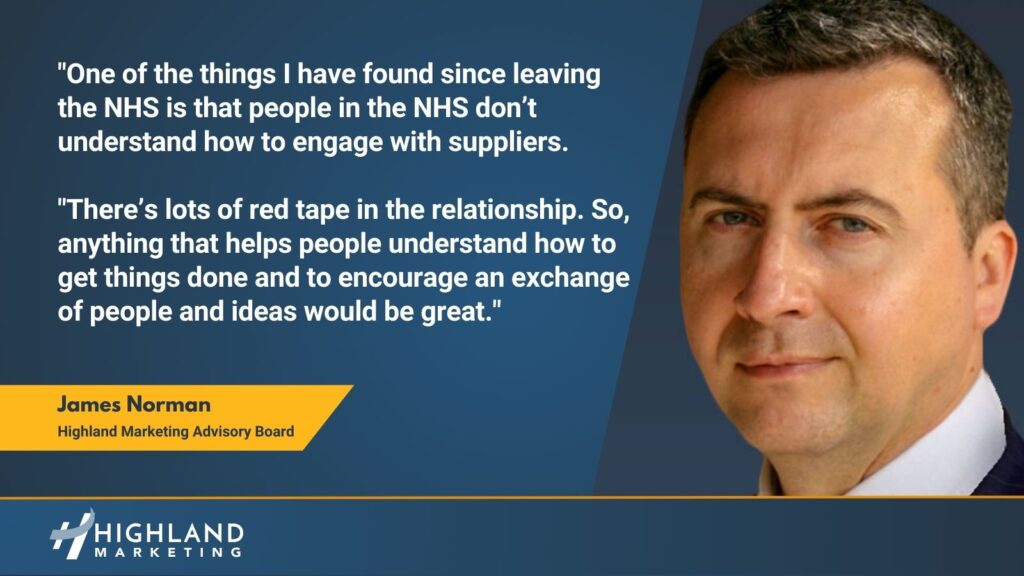The NHS has some significant challenges when it comes to recruiting and retaining the IT professionals it needs. The Highland Marketing advisory board asked Andrew Griffiths, chief executive of FEDIP, to discuss them, ahead of the publication of a new digital workforce plan.
The NHS has some well-known challenges when it comes to staffing. The number of overall vacancies is stubbornly high, at around 10% of the total workforce. Strike action is acting as a ‘drag anchor’ on efforts to recover from the Covid-19 pandemic.
Surveys suggest that staff near retirement would like to go early, while a surprisingly high proportion of doctors and nurses abandon their NHS careers within months of qualification. Against this backdrop, there are some additional challenges in health tech.
Andrew Griffiths, the chief executive of FEDIP [the Federation for Informatics Professionals in Health and Care], opened a Highland Marketing advisory board discussion by outlining a few key ones. “The first question is how we get people to work in health and care, when we may have less to offer than big tech companies, or even start-ups,” he said.
“Then, there’s the whole recruitment process. NHS recruitment is not flexible, and that’s a problem because advertising a job, and then not interviewing for three months, or making an offer, but taking six months to run checks, does not work. People go elsewhere before you can secure them.
“There’s the whole Agenda for Change thing [which makes it hard to grade IT jobs at a level that secures a competitive salary]. When people are recruited, career paths are not obvious. And we have a problem with retention, perhaps, again, because the NHS environment is not as attractive as it should be.”
Inspiring a new generation
Entrepreneur Ravi Kumar was interested in how to make young people aware that it is possible to pursue a career in IT in the NHS. “I go to careers weeks at local schools and colleges, and I don’t see NHS managers at them,” he said. “So, the first challenge is making people aware that they can aspire to do this. Perhaps trusts could offer internships to inspire people to work for them.
Andrew agreed with this. “When I started in healthcare, I had no idea that you could work in technology in healthcare,” he said. “I suspect that is still the case for a lot of people.” FEDIP is keen to accredit university courses, so people can study health tech, and is talking to private recruitment agencies about how to get their graduates into NHS jobs.
Defining an occupational architecture
FEDIP is also working to define the profession recruits will be entering. As part of that, it’s drawing up job roles based on competencies that can be mapped against NHS pay grades. “We are really trying to do it as a profession, so the profession can own its roles and keep them up to date, Andrew said.
“We call it occupational architecture, as it describes the skills and competencies organised into job roles but in a way that can be used for individuals to build a career and to make sure they are qualified in their existing roles. We want the descriptions and tools to be helpful in practical ways to guide CPD to encourage leaning and development and to create a vibrant profession that knows what good practice is and ensures those working in it are trained and up to date with that good practice.
David Hancock, a new member of the advisory board who made his career at leading health tech companies, said competency frameworks are incredibly hard to define. His tips were to “work with the willing” and to pick some “common and important” roles to work on first because “you don’t need to think big to still have massive value.”
Sorting out recruitment
Advisory board chair Jeremy Nettle suggested it would be helpful if the NHS could set up a single website on which health tech jobs are advertised “so people can see what is available” and individual trusts don’t have to argue about titles and grading.
Andrew said he’d love to get there. “We have got some job profiles on our website, and we are working on more,” he said. “And we are getting a panel together to do some job matching with the AfC grades, so we can say: ‘We can’t force you to use this, but it is a benchmark.’”
He also argued it would be good if the NHS was more proactive. “There’s no way to pick up the ‘second place’ people from a particular recruitment and find the right spot for them,” he pointed out. “If we could do that, it would be a much more welcoming environment.”
Jeremy suggested the health service could go further, again, by creating a national organisation to recruit and train technology professionals. Andrew agreed this would be an interesting idea – “and not that far off the deanery model for junior doctors.” However, there would need to be widespread buy-in and much more work on standardisation to make it work.
Identifying a career path
The occupational architecture should also help to define career paths. People working in health tech will be able to identify the skills they need to remain competent in their current role or to move into a new one and undertake the CPD and training required.
Ian Hogan, an NHS CIO who is about to move jobs, said he also wanted to see health tech professionals becoming members of a professional body. The core of FEDIP’s work is to encourage people to do this and then join its professional register.
“To show the value of informatics in health, we need to get people to register, and my question is: ‘How do we make that a requirement?’” he said. “If you want to be a management accountant, or work in NHS finance, you have to do this. But when I talk about registration to my teams, there’s an element of: ‘So what?’”
Andrew agreed registration was an uphill battle because: “It’s a chicken and egg issue – nobody wants to join a club with nobody in it, but if nobody joins the club it can’t develop.”
Better relationships with suppliers
FEDIP is trying to find incentives beyond giving members the chance to be part of the development of health tech as a profession. For example, it has set up a Future Digital Leaders forum, which is looking to extend is current package of support, webinars, and access to the Digital Health summer schools and other opportunities to develop.
To do this, it is willing to consider industry sponsorship, and to bring in people working on the supplier side. James Norman, a former NHS CIO who now works for Pure Storage, argued that greater exchange between the NHS and its suppliers would be valuable.
“One of the things I have found since leaving the NHS is that people in the NHS don’t understand how to engage with suppliers,” he reflected. “There’s lots of red tape in the relationship. So, anything that helps people understand how to get things done and to encourage an exchange of people and ideas would be great.”

Recognising progress
Andy Kinnear, a former NHS CIO who now works for Ethical Consulting, and who has been deeply involved in professional development over his career, argued health tech is at least making progress. “If you look at the medical profession, it took doctors 100 years to go from robbing graves to being members of royal medical colleges,” he said.
“It took nurses something like 40 years to be recognised as a profession. So, the fact that we have six bodies in place and signed up to FEDIP, and we are working on occupational architecture – I think we should be congratulating ourselves on that, and I don’t think it will take us 100 years if we just keep going.”
Nicola Haywood-Cleverly, a former NHS CIO who now works for her local police force, was also relatively optimistic. “We have a lot of the same issues,” she said, “but if we look at health and the work that has been done to set up communities like FEDIP, there is nothing like that in policing.
“Nor is there anything like a digital clinician in policing. In fact, I’m just talking to some colleagues about what a ‘digital police officer’ might mean. So, we have a lot to learn from health and other sectors.”
Addressing the retention challenge
Having said that, the advisory board felt that all these efforts will go nowhere unless the NHS values its health tech professionals and invests in their work.
Jeremy observed that trusts and ICBS are seeing something of an exodus of senior IT leaders at the moment: “I think people are stepping away because IT is not being funded in the way it needs to be and patients are not seeing the benefits,” he said. “We have to recognise that if we want organisations in the NHS and social care to use digital, it has to be better funded and supported.”
Valuing health tech
The NHS is on the verge of publishing a delayed digital workforce plan, which will look at some of the issues discussed by the advisory board. However, Neil Perry, a former NHS CIO who has just left to work in consultancy, also felt it will go nowhere, unless this fundamental point is addressed.
“We need good health tech leaders at a national, regional and local level to bring everybody else along,” he said, “and we need boards engaged with this agenda. It feels like everybody is focused on the finances and the waiting lists – but we are in the middle of one of the biggest digital programmes since the National Programme for IT and we need to get it right.”
Notes
About Andrew Griffiths: Andrew Griffiths worked in the health service for more than 30 years. Before joining FEDIP as chief executive, he was chief information officer for the NHS in Wales.
About FEDIP: The Federation for Informatics Professionals in Health and Social Care is a collaboration between six professional bodies, which are licensed to offer their members FEDIP registration at five levels ranging from associate to leading practitioner, depending on their competence, knowledge and experience in the field.
Registration enables professionals to advance the development of health tech, to display their credentials to colleagues and peers, and to encourage employers to value their skills. https://www.fedip.org


